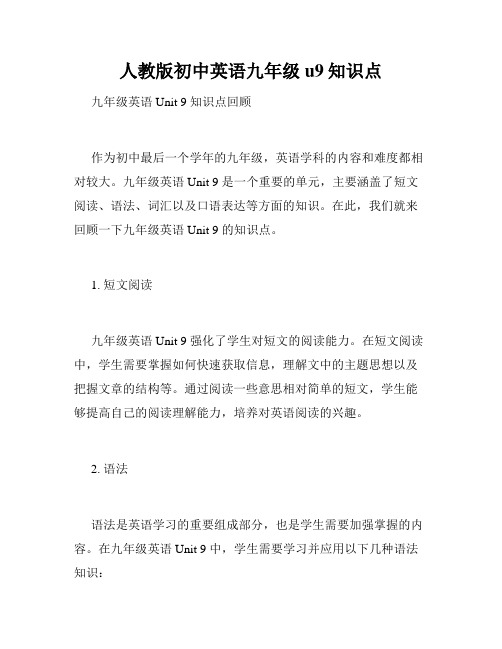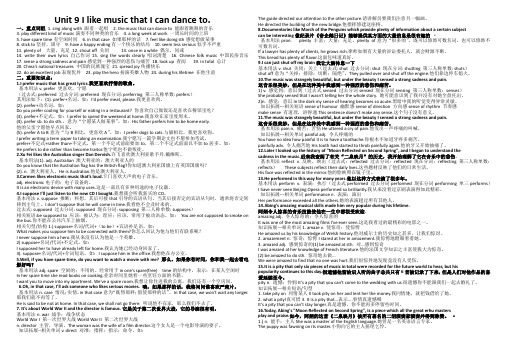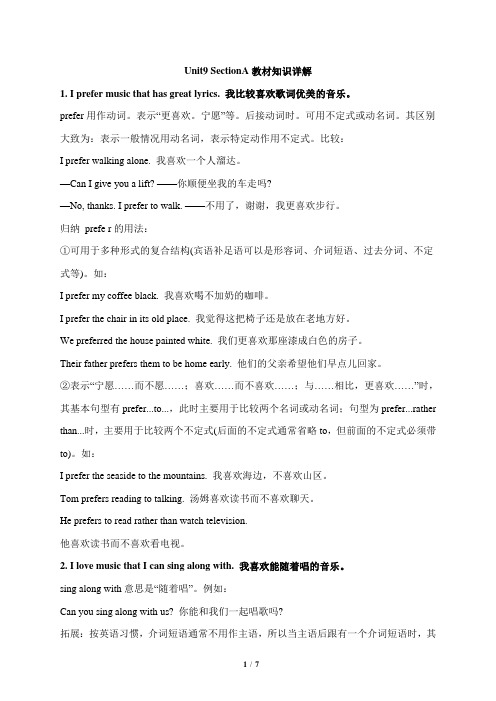九年级英语上册unit9知识要点
人教版初中英语九年级u9知识点

人教版初中英语九年级u9知识点九年级英语 Unit 9 知识点回顾作为初中最后一个学年的九年级,英语学科的内容和难度都相对较大。
九年级英语 Unit 9 是一个重要的单元,主要涵盖了短文阅读、语法、词汇以及口语表达等方面的知识。
在此,我们就来回顾一下九年级英语 Unit 9 的知识点。
1. 短文阅读九年级英语 Unit 9 强化了学生对短文的阅读能力。
在短文阅读中,学生需要掌握如何快速获取信息,理解文中的主题思想以及把握文章的结构等。
通过阅读一些意思相对简单的短文,学生能够提高自己的阅读理解能力,培养对英语阅读的兴趣。
2. 语法语法是英语学习的重要组成部分,也是学生需要加强掌握的内容。
在九年级英语 Unit 9 中,学生需要学习并应用以下几种语法知识:2.1. 定语从句定语从句是一种描述名词或代词的从句,用来修饰或限定名词或代词的意义。
通过学习定语从句,学生可以更准确地描述和表达人或物的特征,从而让自己的英语表达更加精彩。
2.2. 状语从句状语从句是一种修饰主句的从句,它可以表示时间、原因、目的、条件、方式等。
学生需要学会运用不同的状语从句来丰富自己的句子,让表达更具逻辑性和准确性。
2.3. 虚拟语气虚拟语气是英语中一种表达假设、愿望、建议等非真实情况的语气。
通过学习虚拟语气,学生可以提高自己的语言表达能力,让自己的意思更加明确和有说服力。
3. 词汇词汇是语言的基础,也是学生英语学习中的重点。
在九年级英语 Unit 9 中,学生需要巩固和扩展一些与话题相关的词汇,如环境、污染、保护等。
通过积累和运用这些词汇,学生可以更好地理解和表达与环境保护相关的概念和观点。
4. 口语表达口语表达是英语学习中的一项重要技能,也是与他人进行交流的主要方式。
在九年级英语 Unit 9 中,学生需要通过一些话题讨论和角色扮演等活动来提高自己的口语表达能力。
通过与同学们的互动和交流,学生可以更流利地表达自己的意见和观点。
人教版九年级英语Unit 9知识点总结

九年级英语Unit 9 I like music that I can dance to 讲义一、词性转换Section A1. Australian → (n.) Australia2. director → (v.) direct3. smooth → (v.) smoothen4. ending → (n.) end5. documentary → (n.)document6. intelligent – (n.) intelligenceSection B7. sadness → (adj.) sad8. pain → (adj.) painful9. moving → (v.) move10. perform → (n.) performance11. popular → (n.) popularity二、短语归纳1. sing along with 跟着一起唱2. dance to 随着跳3. different kinds of 不同类型的4. a long week at … 一周长时间的……5. spare time 空闲时间6. in that case 既然那样7. stick to 坚持,固守8. depend on 取决于9. be down 失落10. cheer sb. up 使某人振作起来11. a happy ending 美满的结局12. try one’s best 尽最大努力13. solve one’s problems 解决某人的问题14. a goo way to do sth 一种……好方法15. plenty of 大量,充足16. a certain subject 某个主题17. action movie 动作片18. scary movie 恐怖电影19. shut off 关闭,停止运转20. save the world 拯救世界21. just in time 及时22. once in a while 偶尔地,间或23. do sth alone 独自做某事24. bring a friend 带上一个朋友25. be afraid of sth 怕……26. feel scary 感到害怕/恐怖27. each kind of 每种28. write one’s own lyrics 自己写词29. musical instruments 乐器30. a piece of music 一首乐曲31. folk music 民俗音乐32. cry along with 随着哭33. look up 查阅,抬头看34. teach sb. to do sth. 教某人做某事35. grow worse 变得更糟36. develop a serious illness 得了很严重的病37. become blind 变成盲人38. live on the street 住在街上39. play on the street 在街上表演40. in this way 以这种方式41. musical skills 音乐技能42. during one’s lifetime 在某人的一生中43. in total 总共,总计44. for this reason 由于这个原因45. painful experiences 痛苦的经历46. touch the heart(s) of sb. 打动人心47. pain and wounds 痛苦和创伤48. praise sb. as称赞某人为1. I suppose… 我想……2. feel like doing 想做某事3. too + adj. + to do 太……而不……4. not do sth anymore 不在做某事5. It is a pity that… 遗憾的是……6. …is a time for… ……是一个……的时间三.重点句子1. I prefer music that has great lyrics.我更喜欢有好歌词的音乐。
九年级英语Unit9 知识点

Unit 9 I like music that I can dance to.一、重点词组1. sing along with 跟着一起唱 2. the music that can dance to 能跟着跳舞的音乐3. play different kind of music演奏不同种类的音乐4. a long week at work 一周长时间的上班5. have spare time有空闲时间6. in that case 如果那样的话7. feel like doing sth感觉想做某事8. stick to坚持,固守9. have a happy ending有一个快乐的结局10. seem less serious似乎不严重11. plenty of 大量,充足12. shout off 关闭13. once in a while 偶尔,间或14. write their own lyrics 自己作词15. sing the words clearly 唱词清楚16. Chinese folk music 中国民俗音乐17. sense a strong sadness and pain感觉到一种强烈的悲伤与痛苦18. look up 查阅19. in total 总计20. China’s national treasures 中国的民族瑰宝21. spread joy传播快乐22. do an excellent job表现优异23. play the hero扮演英雄人物24. during his lifetime 在他生前二。
重要知识点:1.I prefer music that has great lyrics.我更喜欢抒情的歌曲。
基本用法v. prefer 更喜欢,宁愿(过去式: preferred 过去分词: preferred 现在分词: preferring 第三人称单数: prefers)其用法如下:(1). prefer+名词。
人教版英语九年级Unit9全单元知识点讲解

(2)kind of +adj.有点,有几分=a little+adj. (3) adj. 友好的
be kind to sb. = be good to sb.=be friendly to sb. 对某人友好
2. It's kind _ you _ help me with my English. A. of; to B. for; to C. of; for D. to; to
• suppose v.推断;料想;猜想
eg: I suppose I'll just listen to the new CD I bought.
Oh, in that case, I'll ask someone who likes serious movies. • war n.战争;战争状态
1. What is Sott going to do this weekend?
He will just listen to this new CD he bought.
He sticks to speaking English every day.
ex:— Don’t lose heart; ______and never give up. I’m sure you’ll succeed one day. — Thanks. I will try my best. A. stick learning B. go on to learn C. stick to learn D. stick to learning
人教版九年级全一册英语Unit9单元语法知识点总结

人教版九年级全一册英语Unit9单元语法知识点总结本单元重点短语的具体用法1. dance to (music):随着(音乐)跳舞- The children danced to the music at the party.(孩子们在派对上随着音乐跳舞。
)2. sing along with:随着...一起唱- I like to sing along with the radio.(我喜欢随着收音机一起唱歌。
)3. musicians who play different kinds of music:弹奏不同类型音乐的音乐家- The band has musicians who play different kinds of music, including pop and jazz.(这个乐队有弹奏不同类型音乐的音乐家,包括流行音乐和爵士乐。
)4. electronic music:电子音乐- Electronic music is becoming more and more popular.(电子音乐越来越受欢迎。
)5. not much:没什么(事)- - How are you? - Not much.(- 你好吗?- 没什么事。
)6. suppose sb to do sth.:猜想某人做某事- I suppose him to be a doctor.(我猜他是个医生。
)7. be supposed to do sth:应该做某事- You are supposed to hand in your homework on time.(你应该按时交作业。
)8. suppose sb (to be) + adj.:原以为...- I supposed her to be honest, but I was wrong.(我原以为她是诚实的,但我错了。
)9. have spare time:有空闲时间- I don't have much spare time these days.(我最近没有太多空闲时间。
九年级上册英语unit9重点知识点

九年级上册英语unit9重点知识点九年级上册英语Unit 9重点知识点九年级上册英语Unit 9是学习课文《Can you come to my party?》的重点单元。
在这个单元中,学生需要掌握一些重要的知识点,包括常用表达方式、时态用法、词汇拓展等内容。
在本文中,我们将对这些知识点进行详细的分析和介绍。
一、常用表达方式在Unit 9中,有一些常用的表达方式需要我们掌握和运用。
例如,当你邀请别人参加你的派对时,可以用句型“Do youwant/like/love to come to my party?”。
回答时,可以使用句型“I'd love/like to.”或者“Sorry, I can't.”来表示接受或拒绝邀请。
此外,还有一些其他的表达方式,比如“Are you available on...?”(你...有空吗?)和“Could you please...?”(你可以...吗?)等等。
二、时态用法在Unit 9中,我们需要灵活运用一些时态来描述过去、现在和将来的动作。
例如,当询问别人是否有空来参加你的派对时,可以用现在进行时来表示将来的行动,如“What are you doing onSaturday night?”(你周六晚上有什么安排?)。
当接受他人的邀请时,可以用将来时来表达,如“I will come to your party.”(我会来参加你的派对)。
同时,还需要注意一些常用的过去时态,如一般过去时和过去进行时。
三、词汇拓展在Unit 9中,我们还需要掌握一些与派对相关的词汇,并学会拓展应用。
例如,单词“party”可以和其他单词组合形成其他表达方式,比如“birthday party”(生日派对)、“costume party”(化妆舞会)等等。
此外,还有一些与时间和日期有关的词汇,如“next week”(下周)、“last night”(昨晚)、“tomorrow”(明天)等等。
人教英语九年级全册Unit9_SectionA教材知识详解

Unit9 SectionA教材知识详解1. I prefer music that has great lyrics. 我比较喜欢歌词优美的音乐。
prefer用作动词。
表示“更喜欢。
宁愿”等。
后接动词时。
可用不定式或动名词。
其区别大致为:表示一般情况用动名词,表示特定动作用不定式。
比较:I prefer walking alone. 我喜欢一个人溜达。
—Can I give you a lift? ——你顺便坐我的车走吗?—No, thanks. I prefer to walk. ——不用了,谢谢,我更喜欢步行。
归纳prefe r的用法:①可用于多种形式的复合结构(宾语补足语可以是形容词、介词短语、过去分词、不定式等)。
如:I prefer my coffee black. 我喜欢喝不加奶的咖啡。
I prefer the chair in its old place. 我觉得这把椅子还是放在老地方好。
We preferred the house painted white. 我们更喜欢那座漆成白色的房子。
Their father prefers them to be home early. 他们的父亲希望他们早点儿回家。
②表示“宁愿……而不愿……;喜欢……而不喜欢……;与……相比,更喜欢……”时,其基本句型有prefer...to...,此时主要用于比较两个名词或动名词;句型为prefer...rather than...时,主要用于比较两个不定式(后面的不定式通常省略to,但前面的不定式必须带to)。
如:I prefer the seaside to the mountains. 我喜欢海边,不喜欢山区。
Tom prefers reading to talking. 汤姆喜欢读书而不喜欢聊天。
He prefers to read rather than watch television.他喜欢读书而不喜欢看电视。
九年级英语全册 Unit 9基础知识必背手册

Unit 911.酸味the sour taste 12.发出一股清香product a pleasant smell13.在第六世纪in the sixth century 14.收到某人的欢迎be enjoyed by sb15.球员的平安the safety of the players16.在硬的木板上on a hard wooden floor17.与某人相撞knock into sb 18.倒下fall down19.把…划分成…divide…into… 20.在历史上in history用法集萃1. 给某人某样东西give sth. to sb. 如:I gave a pen to him. 我给他一支笔。
give sb. sth. I gave him a pen. 我给他一支笔。
2. make sb./sth. +形容词使…怎么样It made me happy. 它使我快乐make sb./sth. +名词让…做…It made me laugh. 它让我发笑3. fall into 落入掉进如:The leaf fell into the river. 叶子落入了河里。
fall down 摔倒如:She fell down from her bike.她从她自行车摔倒了。
4. quite 超级adv. 与冠词a连历时,冠词a必需放在它的后面。
如:quite a beautiful girl 一个漂亮的女孩very 超级adv. 与冠词a连历时,冠词a必需放在它的前面 .如:a very beautiful girl 一个漂亮女孩注:当不与冠词a 连历时,二者能够互用如:I am very happy.=== I am quite happy. 我超级快乐。
重点句子点拨1. They’re used for seeing in the dark.它们被用于在黑夜里观看。
点拨1:be used for意为“被用来做……”,介词for指目的和用途。
- 1、下载文档前请自行甄别文档内容的完整性,平台不提供额外的编辑、内容补充、找答案等附加服务。
- 2、"仅部分预览"的文档,不可在线预览部分如存在完整性等问题,可反馈申请退款(可完整预览的文档不适用该条件!)。
- 3、如文档侵犯您的权益,请联系客服反馈,我们会尽快为您处理(人工客服工作时间:9:00-18:30)。
九年级英语上册Unit9 I like music that I can dance to一、语法:定语从句Ⅰ、概念定语从句:就是在复合句里充当定语的从句,它通常紧靠在所修饰的名词或代词后面。
被定语从句修饰的名词或代词称为先行词。
引导定语从句的词叫关系词。
关系词有关系代词who, whom, whose, which和that等;关系副词有when, where, why等。
关系词不仅起连接作用,而且还代表先行词并在定语从句中担任某一句子成分,关系代词作主语、宾语、定语、表语等,关系副词作状语。
This is the book that my father bought me yesterday. 这就是我父亲昨天帮我买的那本书。
说明:句中修饰the book的that my father bought me yesterday就是定语从句;被定语从句所修饰的the book这是先行词;代表the book的关系代词that在定语从句中作bought的直接宾语。
The time when he arrives is not known. 他到达的时间还不知道。
说明:句中when he arrives是定语从句,被定语从句修饰的the time是先行词,关系副词when作时间状语。
Ⅱ、关系代词的一般用法:所谓关系代词,就是在定语从句中代替先行词在从句中充当成分(充当主语,宾语或表语)先行词是人,在从句中作主语用who,作宾语用whom或who,作定语用whose;先行词是物,在定语从句中作主语或宾语都用which,作定语用of which或whose均可。
在限制性定语从句中which, who, whom都可用that代替。
限定性定语从句:不能省略,如果省略整个句子意思不完整非限定性定语从句:可以省略,如果省略整个句子意思仍然完整(主句与从句用逗号隔开)This is the man who helped me yesterday. 这就是昨天帮助我的那个人。
(作主语)The teacher (who/whom/that) you want to see is coming. 你要见的老师来了。
(作see的宾语,可以省略)I met a boy whose father was a astronaut. 我认识一位男孩,他的父亲是宇航员。
(作定语)Here is the coat which/that will be made to you. 这是一件做给你的衣服。
(作主语)This is the factory (which/that) we visited last year.这就是我们去年参观的那家工厂。
(作visited的宾语,可以省略)He has a book whose cover (=the cover of which) is very beautiful. 他有一本封面非常漂亮的书。
Ⅲ、关系副词的用法:关系副词有when, where, why,在定语从句中作状语,分别表示时间、地点和原因。
when 的先行词通常是time, day, season, age, occasion等时间名词;where的先行词通常是place, city, town, village, house, case, situation, scenes等地点或情形名词;why的先行词只能是reason。
关系副词when和where有时可用“介词+which”代替,,when = in/at/during + which,where = in/at/on/under + which 。
why可用for which代替。
如:There are occasions when (=on which) one must yield. 任何人都有不得不屈服的时候。
Beijing is the place where (=in which) I was born.北京是我的出生地。
Is this the reason why (=for which) he refused our offer?这就是他拒绝我们帮助他的理由吗?注意:先行词虽然是时间或地点,但若在定语从句中作主语或宾语时,要用关系代词。
(1)The factory where his father worked has closed. 他父亲曾工作的那家工厂关闭了。
(作状语)比较:The factory which/that was built in 1978 has closed. 1978年建的那家工厂关闭了。
(作主语)(2) I’ll never forget the days when we lived together. 我永远也忘不了我们一起生活的那些日子。
(作状语)比较:I’ll never forget the days that we spent in Australia. 我永远也忘不了我们在澳大利亚度过的那些日子。
(作及物动词spent的宾语)(3) The reason why she was ill was that she had eaten bad meat. 她生病的原因是她吃了变质的肉。
(作状语,用关系副词)比较:The reason that he gave for his absence was obviously fabricated.他所说的缺席理由显然是编造的。
(作gave的宾语,用关系代词)是用关系代词还是关系副词,首先要分析从句句子结构,看从句缺的什么:缺主语,宾语或是表语用关系代词;缺状语用关系副词。
Ⅳ、习惯上用that的定语从句:①先行词被序数词、形容词最高级以及前面Only, any, few, little, no, all, one of, the same, the very 等词修饰的时候This is the first film that I have seen since I came here.这是我到这里后所看的第一场电影。
This is the best that has been used against pollution. 这是用来防止污染的最好办法。
This is the very book that I am looking for. 这正是我一直在寻找的那本书。
The only thing that we can do is to give you some money.我们唯一能做的就是给你一些钱。
Li Ming is the only one that wants to be a teacher.李明是唯一一个想成为一名教师。
Those were the very words that he said at the meeting. 这些就是他在会上说的原话。
All that glitters is not gold. 闪光的并不都是金子。
②当先行词是指物的all, little, few, much, any, anything, everything, nothing, none, the one时All that can be done has been done. 能做的都已经做了。
He will tell you everything that he heard about it.他将告诉你他所听到的关于这件事的一切。
③先行词包括人和物时They often talk about the people and the things that they are interested in.他们常常谈论那些他们感兴趣的人和事。
④当主句是以who或which开头的疑问句时,为了避免重复,多用that引导。
如:Which is the house that caught fire last night? 昨晚失火的是那座房子?Who is the lady that is playing the piano? 在弹钢琴的那位小姐是谁?Ⅴ、习惯上不用that的定语从句:①关系代词前有介词时,一般用which或whom、whoseThe house in which we live is not large. 我们住的房子不大。
I know the young man with whom you live. 我认识和你住在一起的那个年青人。
但当介词放在从句的末尾时,可以用that替代which, who替代whom,也可以省略关系代词。
如:The house (which/that) we live in is not large. 我们住的房子不大。
I know the man (whom/who/that) you live with. 我认识和你住在一起的那个人。
②引导非限定性定语从句(主句与从句用逗号隔开)时Football, which is a very interesting game, is played all over the world.足球风靡全世界,它是一项很有趣的运动。
特别提示:做这样的题要看从句中缺什么成分:牢记:缺主语或宾语或表语用关系代词,缺状语用关系副词。
二、课文知识要点:1、I like music that I can dance to.我喜欢能随之跳舞的音乐。
dance to “伴随着……跳舞”;to 介词,意为“随着、伴随”。
to dance to the music of a rock group随着摇摆舞乐队的乐曲跳舞to dance to quiet music和着怡静的乐曲跳舞to dance to music按音乐节拍跳舞The girls dance to the beautiful music.女孩们随着优美的音乐翩翩起舞。
2、I prefer music that has great lyrics.我更喜欢歌词优美的音乐。
prefer 及物动词,意为“更喜欢”,相当于like…better,后接名词、代词。
prefer → preferring → preferred → prefer red【注意】:prefer 的过去式、过去分词和现在分词都要双写rWhich do you prefer,rice or bread?你更喜欢哪一样,米饭还是面包?Prefer的常见搭配:(1) prefer A to B=like …better than “比起B,更喜欢A ”He prefers English to math. 比起数学他更喜欢英语。
(2) Prefer (sb) to do sth. “更喜欢做某事”I prefer you to stay here a little longer.我更喜欢你在这里多呆一会儿。
